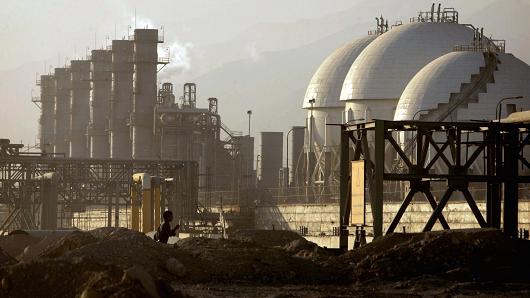 A view of a petrochemical complex in Assaluyeh on Iran's Persian Gulf coast.[/caption]
A view of a petrochemical complex in Assaluyeh on Iran's Persian Gulf coast.[/caption]Falling oil prices don't endanger Iran's budget for now, but crude's plunge could weaken the country's position in ongoing nuclear talks.
Iran and other oil producers lobbied top OPEC producer�Saudi Arabiato cut output at the latest meeting of the organization in Vienna last week, but to no avail. One year ago,�Brent crude�was in the $120-a-barrel range. Since then it has fallen to a five-year low, losing more than a third of its value and�sitting below $72 a barrel on Tuesday.
The Iranian government developed a budget based on oil at $100 barrel. Petroleum accounts for 80 percent of Iran's exports, according to the CIA World Factbook.
Still, Iran's budget may be insulated from the pain, for now. "There's no direct hit to the current budget from the recent oil price slump," said Ramin Rabii of Turquoise Partners, one of Tehran's main investment firms. "But if oil prices remain low for too long, it can become a problem."
Since 2004, 30 percent of Iran's oil revenue has gone into a "National Development Fund" that was set up to fortify the country's economy in case of a major drop in the price of oil. Another plus for Iran is that it only costs the National Iranian Oil Company between $10 and $15 to produce a barrel of oil, so even now, the energy business is still profitable.
Nuclear disadvantage
While safeguards were erected to protect Iran's economy from steep oil drops, crude's fall does appear to give an advantage to the�United States,�Britain,�France,�China,�Russia�and�Germany�in their ongoing nuclear standoff with the Islamic Republic.
"The Iranian government doesn't have a clear strategy, and the lack of foreign investment and Iran's isolation from the global financial system means that it may be too late for Iran to escape its dependence on oil exports, unless a nuclear deal is reached and sanctions eased," according to Rand Corp. Iran analyst Alireza Nader.
Iran's Supreme Leader Ayatollah Khamenei has said that the Islamic Republic will not let falling oil weaken its stance on the nuclear front, calling on the country to create "an economy of resistance."
Most analysts including Nader see that as wishful thinking and believe that if oil prices keep falling so will Iran's negotiating position in the nuclear talks.
Tehran's stock exchange has fallen 5 percent since�OPEC�led by Iranian rival Saudi Arabia�decided last week against cutting production. Turquoise's Rabii attributed that decline less to the price of oil than to Iran's inability to strike a nuclear agreement with a group of countries comprising the five permanent�United Nations�Security Council members plus Germany.
While talks were extended for a second time, Iranians remain nervous that new economic sanctions are coming, and that's an even bigger worry than oil's decline. "Psychologically that has a bigger impact right now," Rabii said.
By CNBC
The Iran Project is not responsible for the content of quoted articles.











